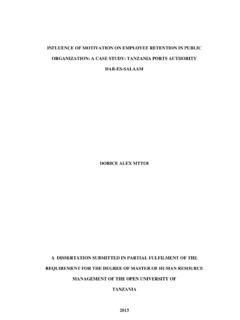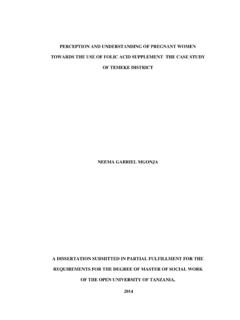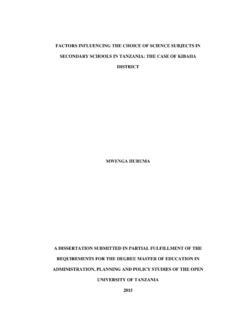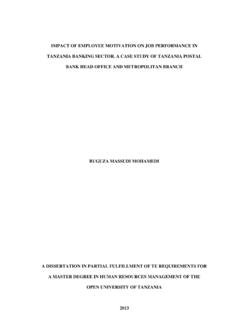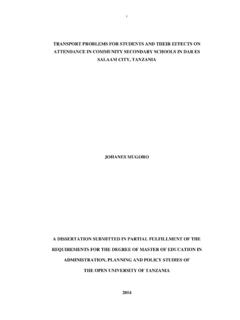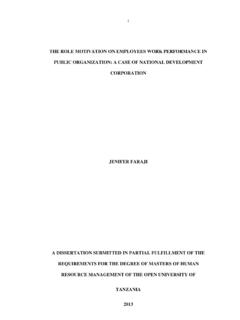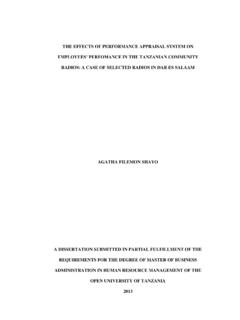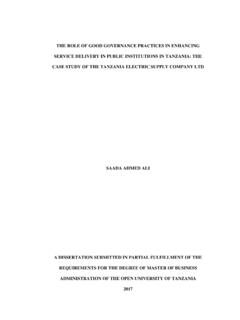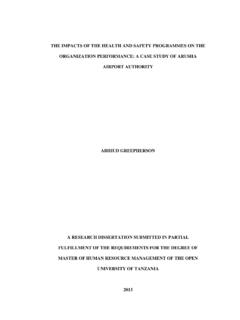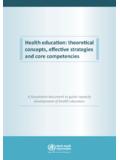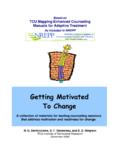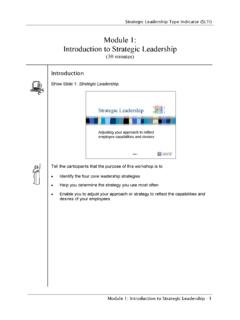Transcription of ASSESSMENT OF FACTORS INFLUENCING …
1 ASSESSMENT OF FACTORS INFLUENCING employee retention INTANZANIA S NON-GOVERNMENTAL SECTORS: A CASE STUDY OFIFAKARA HEALTH INSTITUTEIREMA MARY CALIST iiA DISSERTATION SUBMITTED IN PARTIAL FULFILLMENT OF THEREQUIREMENT FOR THE DEGREE OF MASTERS OF PROJECTMANAGEMENT OF THE OPEN UNIVERSITY OF TANZANIA2015iiiCERTIFICATIONThe undersigned certifies that he has read a hereby recommend for acceptance by theOpen University of tanzania , a dissertation entitled: FACTORS INFLUENCING EmployeeRetention in Tanzanian s non-Governmental sectors. A case study of Ifakara HealthInstitute , in partial fulfilment of the requirements for the Degree of Masters inProject Salum S. Mary Calist Irema, do hereby declare that this dissertation is my own original workand that it has not been presented and will not be presented to any other University fora similar or any other degree report is a copyright material protected under the Berne Convention, theCopyright Act 1999 and other international and national enactments, in that behalf, onintellectual property.
2 It may not be reproduced by any means in full or in part, neitherstored in any retrieval system, or transmitted in any form by any means, electronic,mechanical, photocopying, recording or otherwise except for short extracts in fairdealings, for research or private study, critical scholarly review or discourse with anacknowledgement, without the written permission of the school of Graduate Studieson behalf of the author and the Open University of work is dedicated to my late father CalistLokissaMtei , to my mother AnnaLejora , my sons Oswald, Imani, Shoko and Shukrani, my sister Clepatra ,brothersNesphory and John and my sister in Law Lilian Daniel, for their hard work andFinancial assistance for the whole of my thanks go to my husband Mohamed Irema who tolerated my regularwithdrawal from normal family life throughout my MPM completion of this task was not an easy one.
3 It was a result of combined effortsand commitment of many people to whom I heartedly indebted to thank. First andforemost, I thank the God Almighty for giving me the strength to carry out this study. I am proud to acknowledge with a lot of sincere appreciation my academic , a lecturer at Open University of tanzania for spending histime through providing valuable thoughtful comments, advice, guidance, positivecriticism, which helped me complete this study. I hope that all your futureendeavours will be filled with affluence. I am indeed honoured and privileged to callmyself your would also like to express my sincere gratitude to Ifakara Health Institute especiallymy respondents who took time to answer the questions in questionnaires andinterviews. They made a great effort, and without their answers, this study would havenot been sincere gratitude also goes to all MPM students for PG 2014 and 2015 for theirefforts and some guidance without forgetting my friends Paschal George andixAmwesigaBandio.
4 Last but not least, my best friend and son Kahema Irema for hisencouragement and support from the beginning of this study. xABSTRACTThis study assessed the FACTORS INFLUENCING employee retention in non- GovernmentalOrganization in tanzania . The purpose of the study was to assess the factorsperceived by the employees as INFLUENCING retention in Ifakara Health, examine howindividual background influenced staff retention at Ifakara health Institute (IHI).(IHI), examine how staff retention policies and strategies are tailored to maintain staffretention within Ifakara health institute (IHI) and to evaluate the effect of staffhygiene and motivation on staff retention in Ifakara Health Institute, assessingemployers psychological FACTORS INFLUENCING retention in Ifakara Health Institute.
5 ,The study used closed and open ended questionnaires, and Interview questions to thehead of Thematic Groups. Data analysis was done quantitatively and qualitativelyusing Software Package for Statistical Science (SPSS) version The studyfindings revealed that there is a high rate of turnover in non-GovernmentalOrganization in tanzania . The study also revealed that, low salaries and benefits werethe main reasons for employees leaving the organization. Furthermore, employerpsychological FACTORS including organization justice and prestige were mentioned toinfluence employee retention in Ifakara Health Institute. Increasing salaries werementioned to be the strategy used by the Institute in retaining her employees. Severalsuggestions were provided by the researcher that retention strategies should target allstaff categories in order to balance the work force by improving the retention policyor scheme in order to maintain the retention of employees at IHI.
6 The study alsorecommended that Ifakara Health Institute had to improve the employee s salaryxiespecially for middle and lower cadre so as to motivate them and make them stay inthe OF CONTENTSCERTIFICATIONiiDECLARATIONiiiCOP YRIGHTivDEDICATIONvACKNOWLEDGEMENTSviABS TRACTviiTABLE OF CONTENTS viiiLIST OF TABLES xiiiLIST OF FIGURESxivLIST OF ABBREVIATIONSxvCHAPTER Background of the Statement of the research Objectives of the General Specific Research General Research Research Significance of the Scope of the Organization of the study7 CHAPTER TWO8 LITERATURE Conceptual employee Theoretical literature 1 Maslow s hierarchy of needs theory on staff Two-Factor Theory (Herzberg's motivation-hygiene theory) Baby boomers and the Y generation theory on Staff Empirical literature Empirical literature review Empirical literature review in Empirical literature review in Research gap Conceptual THREE33 RESEARCH Research Areas of the Population of the Sampling design and sample Sampling Sample size Methods of data Secondary Primary Data collection Reliability and validity of Reliability of Validity of Data Ethical Issues Considerations40 CHAPTER FOUR42 RESEARCH FINDINGS.
7 ANALYSIS AND of the Demographic Characteristics of Presentation of Findings on Respondent s Findings on Respondents Age of Findings on Respondent s level Findings on Respondent s Marital Respondent s duration of Employment to the Other Respondents Length of Employment with the Respondent s Position at Opinion on Individual Background Influence on Staff Awareness of Employees on Carrier Awareness of Employees on Personal Accomplish Awareness of Employees on Working Tools and Awareness of Employees on Supervisory and Leadership Awareness of Employees on Job Awareness of Employees on the Management use of their Awareness of Employees on Flexible Work Satisfaction of Employees on the Salary and Wages Respondent s Perception to Leave the FACTORS associated with Staff retention at Respondent s Satisfaction with their Position at Perceptions of Employees Recognition as an Respondent s Motivation towards Company Tasks oriented among the Staffs within their Thematic Flexibility of the Company to the Employees Respondent s convincing a Friend to Apply for a Job at Presentation of Findings on the Number of employee Left Staff Hygiene and Motivation on Staff retention at Respondents Working Ethical Standards towards the Employees Employees Responsibilities for their Responses on Perception Level on retention Involvement in Designing retention Items to be Improved to Enable retention of IHI Formulation of retention Strategies at Thematic Group Availability of Motivational Discussions from the Improvements of Salary and Methods
8 Used by the Organizations in Retaining their FIVE73 SUMMARY, CONCLUSION AND of the main of the of the for Further Research79xviREFERENCE81 APPENDICES89xviiLIST OF : Thematic Group where the Respondents : Gender for the : Respondents Age45 Table Respondent s level of Education45 Table Respondents Marital Status46 Table Respondents Respondent s Opinion on Staff retention Strategies49 Table Respondents on Perception to Leave the Institute53 Table 4. 9. Perceptions of Employees Recognition as an Individual56 Table Tasks oriented among the Staffs58 Table Flexibility of Company towards Employees Family58 Table Convincing a Friend to Apply for a Job at IHI Turnover Rate60 Table Working long Hours in the Ethical Standards towards the Employees Behavior62 Table Employees Responsibilities for their Responses on Perception Level on retention Involvement of Employees in Designing retention The Effects of Organization on retention Strategies65 Table Items to be Improved to Enable retention of IHI employees66 Table of Motivational Schemes at IHI67 Table Improvement of employee retention OF FIGURESF igure Conceptual : Length of Employees stayed into other organization 47 Figure.
9 Years of working at Ifakara Health Institute48 Figure Respondents Satisfaction with their Position at : Respondent s motivation towards Company succeed57xixLIST OF ABBREVIATIONSCEDC hief Executive DirectorCHROC hief Human Resource OfficerFGDsFocus Group Discussions HROH uman Resource OfficerIHII fakara Health InstituteNGONon-Governmental OrganizationNIMRN ational Institute for Medical African Development CommunitySPSSS tatistical Package for Social sciences SRSS tratified Random SamplingSSA Sub Sahara African countriesUSAU nited States of America1 CHAPTER Background of the problemEmployee retention is one of the challenges facing many organizations particularlyfrom non-governmental organizations. To Maintain employees, it includes motivatingemployees by providing work friendly, involvement in decision making, good salariesand recognition of good performance.
10 Many organizations are increasingly finding itdifficult to retain employees. Czurak (2011) explained that as our communitycontinues to experience significant growth in the hospitality industry, employeerecruitment and retention has become a today's business world, living with job insecurity is a reality for many employees,Job security usually arises from the term of the contract of employments, laborlegislation and or collective bargaining agreements. Furthermore, studies on staffretention shows that excessive turnover creates unstable workforce and increases thehuman resources costs and organizational ineffectiveness Friedman M, et al (2006).Empirical studies done in private organizations have come up with similar , the rate of employees low staff retention in private sectors in tanzania isincreasing (Bernthal, R &Wellins, S.)
